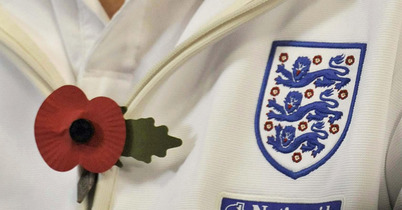The 11th hour of the 11th day of the 11th month.
Like a high proportion of my fellow Brits, when that moment comes, I shall be standing silently with my head bowed in a gesture of solemn remembrance.
So why does it make me so angry when November rolls around each year and, like snowdrops in January, Premier League football shirts sprout scarlet poppies?
It’s chiefly because, for me, the power of the poppy depends on personal choice.
For as long as I can remember, the majority of British citizens have taken a conscious decision in the first week of November to walk up to a tray-bearing vendor and donate a small sum for a paper flower to display and symbolise whatever mixture of sympathy, pride and pity the First World War stirs up in them.
It is their money and it is a personal decision.
As such, it is an expression as powerful as any I can call to mind of the importance of memory and the historical heritage we share.
It also, of course, had a practical dimension in the sense of raising money for those unfortunate enough to be sent to the trenches, as any of us might have been had we been born between the years of around 1880 to 1895.
If the decision to buy a poppy is not a personal one, then, to me, the power of the gesture is undermined.
That is why these poppy-emblazoned football shirts so irritate me.
Now, if the Premier League can convince me that every single one of those high-paid footballers – British or otherwise – I watch take to the field sporting printed poppies in recent weeks did so having taken a conscious decision that this was a gesture they personally wanted to make, then I’ll take this back and doubtless my blood pressure will return to healthier levels.
Until then, the question of putting a poppy on England – and Wales – shirts for matches scheduled on November 12 is a different one.

In this case, it seems rather likely that the players, if asked, would all decide they wanted to make this personal gesture.
But the British government, which came out so strongly in favour of the move, must, surely, have been able to see that it put FIFA in a next to impossible position.
If the footballing governing body had consented to this then it would have set a precedent that could easily have led to a proliferation of similar requests from other countries, some of which the UK Prime Minister, David Cameron, and his colleagues might even find offensive.
Indeed, by agreeing to poppies on black armbands it might yet do so.
What the episode has enabled the Government to do, though, besides prolonging a feud that started when FIFA had the temerity to award the 2018 World Cup to Russia, is portray itself as the stout defender of a much-loved British symbol – and here I think we get to the heart of the matter.
I doubt there is a logo today in Britain with a more positive set of brand associations than the red poppy.
Certainly not those of the Conservative or Liberal Democrat parties; nor the Football Association… not even the Premier League.
The poppy is like a domestic version of the five-ring Olympic logo – and then some: everybody recognises it; very few have a bad thing to say about it.
This, presumably, is one of the reasons why the symbol has outlived all the combatants from the conflict it originally represented.
Very few of us would decline to chip in a small sum to help the veterans and families affected by that appalling conflagration; our feelings towards more recent battles, fought in our name by professional soldiers with no conscription, are not necessarily the same.
Whether intentionally or not, one of the effects of all this talk about football and poppies has been to allow politicians and football bodies to attach themselves to the logo – and what it represents to people – in a manner that has similarities with the way in which TOP sponsors and other multinational corporations try to use the Olympic logo.
One of the problems with this is that it risks debasing what for now remains a very valuable currency – the poppy – to the possible detriment of the very veterans it is used to help.
Indeed, assuming I am not entirely alone in reacting negatively to poppies on Premier League shirts, it already is.
David Owen worked for 20 years for the Financial Times in the United States, Canada, France and the UK. He ended his FT career as sports editor after the 2006 World Cup and is now freelancing, including covering the 2008 Beijing Olympics and 2010 World Cup. Owen’s Twitter feed can be accessed here.
